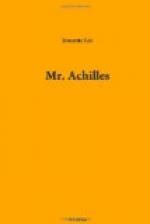face lifted, while he told her of Athens and its beauty...
and he had told her again—and again.
She would never tire of it—as he could
never tire. She was a child of light in the great
new world... a child like himself—in the
hurry of the noise. A sound came to him in the
distant house—people talking—low
voices that spoke and hurried on. The house was
awake—quick questions ran through it—doors
sounded and were still. Achilles turned his face
toward the opening into the long wide hall, and waited.
Through the vista there was a glimpse of the stairway
and a figure passing up it—a short, square
man who hurried. Then silence again—more
bells and running feet. But no one came to the
library—and no one sought the dark figure
seated there, waiting. Strange foreign faces
flashed themselves in the great mirror and out.
The outer door opened and closed noiselessly to admit
them—uncouth figures that passed swiftly
up the stairway, glancing curiously about them—and
dapper men who did not look up as they went.
The house settled again to quiet, and the long afternoon,
while Achilles waited. The light from the high
windows grew dusky under chairs and tables; it withdrew
softly along the gleaming books and hovered in the
air above them—a kind of halo—and
the shadows crept up and closed about him. Through
the open door, a light appeared in the hall. A
moving figure advanced to the library, and paused
in the doorway, and came in. There was a minute’s
fumbling at the electric button, and the soft lights
came, by magic, everywhere in the room. The servant
gave a quick glance about him, and started sternly—and
came forward. Then he recognised the man.
It was the Greek. But he looked at him sternly.
The day had been full of suspicion and question—and
the house was alive to it—“What do
you want?” he said harshly.
“I wait,” said Achilles.
“Who told you to come?” demanded the man.
“I come. I wait,” said Achilles.
The man disappeared. Presently he returned.
“You come with me,” he said. His
look was less stern, but he raised his voice a little,
as if speaking to a child, or a deaf man. “You
come with me,” he repeated.
Achilles followed with quick-gliding foot—along
the corridor, through a great room—to a
door. The man paused and lifted his hand and knocked.
His back was tense, as if he held himself ready to
spring.
A voice sounded and he turned the handle softly, and
looked at Achilles. Then the door opened and
the Greek passed in and the man closed the door behind
him.
A man seated at a table across the room looked up.
For a minute the two men looked at each other—the
one short and square and red; the other thin as a
reed, with dark, clear eyes.
The short man spoke first. “What do you
know about this?” His hand pressed a heap of
papers upon the desk before him and his eyes searched
the dark face.
Achilles’s glance rested on the papers—then
it lifted itself.




